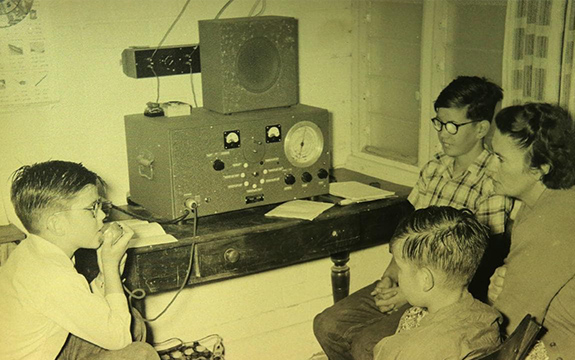Slapping down myths about online learning

In Summary
- Opinion piece for The Australian by Professor Duncan Bentley, Deputy Vice-Chancellor (Academic), Swinburne University of Technology
We reminisce fondly about the School of the Air. It is a quintessentially Australian thing for dedicated teachers to deliver the highest-quality lessons to the most remote parts of Australia by radio, correspondence and now advanced technologies.
In contrast, policymakers have little fondness for online education, particularly higher education. It is time to bust some myths of online education as we celebrate the more than 23 Australian universities delivering education either fully or partly online.
This year, the Swinburne University of Technology celebrates its 20 year partnership with Open Universities Australia and eight-year partnership with SEEK Learning to deliver Swinburne Online.
Does the quality stack up? Let’s debunk three popular myths.
Myth No 1: online education is a cheap, low-quality alternative to face-to-face learning.
As happened in the vocational education sector, inadequate support for regulation of any form of education leads to disaster.
The Tertiary Education Quality and Standards Agency regulates Australian university education with a firm hand. Its job is to ensure that every university course meets quality standards that help Australian universities lead the world.
Effective online education uses expensive, state-of-the-art technologies to engage learners in vibrant virtual communities.
Most Australian online courses provide a rich and connected experience for every learner that is equivalent or better than a physical classroom or campus.
Online students don’t get lost in lecture theatres as big as football stadiums. They interact in very personal online communities, where technology makes sure they can ask questions and find the support they need.
Are learners disconnected by technology? For anyone who has been in a public place, on a train, or in their own home, it is difficult to argue that technology disconnects. We all use it to help us connect. Online learning facilitates broad networks and social learning and working spaces that go well beyond anything we can replicate physically.
Swinburne Online students are largely representative of online students generally and consistently rate their overall experience highly in the national Student Experience Survey.
Last year, more than 86 per cent of Swinburne Online undergraduates and 87 per cent of postgraduates were satisfied with their overall experience compared with national averages for all students of 79 per cent and 76 per cent.
Let’s celebrate Australia’s embrace of technology instead of constantly shooting it down.
Myth No 2 is that online education cannot deliver for the disadvantaged and the underprepared.
OUA’s mission is to make studying at university possible for everyone. Online delivers education for students from low-socio-economic backgrounds, remote and regional students who are nowhere near a study centre, and indigenous students.
A majority of Swinburne Online students are mature-aged, part-time students and many of them feel underprepared and nervous about studying again.
The intensive online support tailored to each individual’s needs with both technology and human intervention available 24/7 simply cannot be matched by any other form of delivery. And according to the national Student Experience Survey, more than 87 per cent of Swinburne Online students are satisfied with student support, compared with 73 per cent of all students nationally. The learners have spoken.
Online technology and delivery gives learners of every age flexibility, choice and control. They have busy lives, most are part-time and they are balancing family, work and study.
It is little wonder they do not complete full degrees at the same rate as school leavers and international students on campus.
A Grattan Institute report last year concluded that the form of delivery was not a significant issue. Rather it is simply more difficult for part-time and less well-prepared students to complete a full degree.
That is why the government has funded OUA students returning to study to try bite-size units to see if they do want to study before enrolling in a full degree.
That is why online providers focus so much support on those first months of study to ensure students are properly prepared for study — including providing a range of academic and support skills training — choosing the right course, and engaging early with their studies.
Online delivery makes it so much easier to interact quickly and effectively to support learners and to identify students in need of help. Swinburne and others are experimenting with micro-qualifications to build confidence and capability.
For these, learners and businesses expect online delivery and Australia can do this effectively at scale.
Finally there is myth No 3, that you won’t get a job with a decent salary if you study online.
Most online students are mature-age, part-time learners, and many are already working. Their online study is either to help them get a better or different job.
While the national Graduate Outcome Survey does not distinguish between modes of delivery, Swinburne Online students consistently achieve high salaries and employment after graduation.
Universities with the largest proportion of online students — such as the University of New England, the University of Tasmania and Charles Sturt University — have among the best employment outcomes. It is important to note that many of these students are part-time and already employed. However, online study clearly is ideal for those students as they upskill and re-skill.
Australia has some of the most remote communities in the world. We have met the learning challenges for these communities using ingenuity, commitment to quality and online delivery.
Now all Australians can choose to participate in the highest-quality online learning. Let us applaud this achievement and avoid using uninformed prejudice to slap down what should be another Australian icon.
Professor Duncan Bentley is Deputy Vice-Chancellor (Academic) at Swinburne University of Technology. Read his opinion piece originally published in The Australian.

